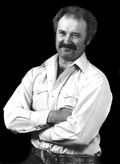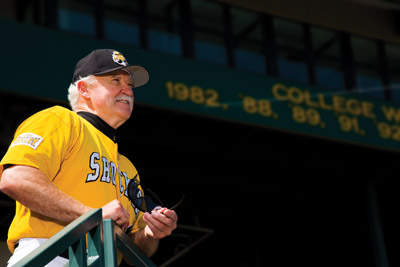
On Feb. 12, 1977, you could have picked up a copy of the Wichita Eagle-Beacon and found advertisements for a then state-of-the-art Polaroid Pronto Range Finder Camera for $53.88, or a 3.5 ounce bottle of Burley after-shave for just 69 cents.
Great buys, we’re guessing.
But the real bargain, the truly outstanding investment secured by Wichita State University, was revealed elsewhere in the newspaper, on the front page of the sports section. A short article introduced readers to WSU’s new baseball coach — a young, confident Oklahoman named Gene Stephenson who promised to revive the dormant program, bring in quality players and deliver a nationally competitive team.
In his first press conference, Stephenson (sans mustache and sporting a full head of curly, dark hair) predicted that he would accomplish all this in four short years — for a salary of 1,000 bucks a month, a ridiculously meager sum compared to the compensation that the 31-year-old had been receiving as an assistant coach at tradition-rich Oklahoma.
“At OU, I was making $25,000, new car every six months, free clothes, football tickets.”
Dramatic (or comedic?) pause.
“Here, I could get football tickets.”
Money was harder to come by. Stephenson says his operating budget was $51,000.
“And that was for everything,” he says. “Everything.”
To this day, Stephenson has the original article — the headline reads New WSU Baseball Coach Pledges Winning Teams — within easy reach in his spacious baseball office. To some extent, it’s the blueprint for all the success he has brought to WSU — success that came quicker than anyone could have expected.
Surprising most, WSU received a near immediate return on its investment in Stephenson as the Shockers reached the NCAA tournament in just three years.

“Nobody, and I mean nobody, believed when we came here that we could accomplish any of the things I talked about that day,” says Stephenson, who makes a point of crediting his wife, Paula, for her support. “Everyone thought I was crazy. I kept the article because I wanted to keep referring to those goals in my mind. Now, when other people doubt what was said or what was planned, I can say, well, you know what, here’s an account of the first press conference.
“Maybe I was just too stupid to know any better, but I never doubted for a single minute. I had boundless energy, and I was so confident in my preparation that I knew we were gonna succeed no matter what. I’m not qualified to say this, of course, but other people have called it one of the greatest stories in sports.”
There would be no argument from loyal Shocker fans, who delighted in WSU’s return to the national stage during the 2007 postseason.
The story’s latest chapter — the team’s thrilling NCAA regional championship in June — has undoubtedly rekindled interest and enthusiasm in Shocker baseball.
To be sure, no one would dare suggest that the always fiery and competitive Stephenson ever lacks for passion or that his intensity has dimmed. Still, it’s fair to assume that he, like the fans, has been invigorated by the team’s postseason run.
“Definitely,” agrees senior catcher Tyler Weber. “I think the regional championship kind of gave him a lot more energy. We finally got over the hump, so he knows we can do it and it’s made him ready for this coming year; we’ve got a lot of guys back and new guys ready to step in.
“Plus, the whole city got behind us and people are noticing Shocker baseball more. Gene appreciates seeing that side of it.”
Indeed, two months after WSU captured the regional title in stirring fashion, fighting back from the losers’ bracket before beating Arizona 3-0 in the title game in front of a sold-out Eck Stadium crowd, Stephenson is still clearly moved by the memory.
“It was awesome,” he says. “The support hadn’t been to that extent in a long time, where there was overflow crowds, people couldn’t get in. It was just a great, great setting. The players were excited; the fans were excited. Everything was just super.” And there is more reason for optimism.
In addition to WSU regaining a national presence by winning a regional and hosting a super regional, a plan is finally in place for a much-needed indoor practice facility. Located adjacent to Eck Stadium, the 22,500 square-foot addition will boast field turf, full infield and retractable batting cages.
While stressing that people and not buildings are the key to success, Stephenson nonetheless says that an indoor practice facility should lead to more wins during the early portion of the schedule, when WSU often battles teams from warmer climates.
Stephenson emphasizes that he looks forward to every season, but he concedes that this is a wonderful time for Shocker baseball.
“Look, at my age the time goes by so quick that the years are over before you even realize it,” he says. “I look forward to every day. I wake up in the morning, and I’m happy.

“But I do think our situation is a little more special right now because we have things on the horizon that appear to excite most people.”
There’s no crying in baseball — it says so right on a paper weight that sits front and center on Stephenson’s desk. It was surprising, then, when he came close to breaking the rule.
By way of explanation, let’s stipulate that Stephenson is a complex man — a fact any close observer of the program would agree to. He can certainly be demanding, evidenced by the icy glare he gives from the third-base coaching box when batters swing at bad pitches or miss bunts.
He can be brutally frank. When the Shockers were upset by Missouri State in the Missouri Valley Conference tournament, he offered up this bit of criticism: “We might not be the dumbest team in America, but we’re pretty close.”
He can be proud and protective of his legacy. Wichita State hasn’t been to the College World Series since 1996 — a fact Stephenson is reminded of far too often. “It hurts a lot when you know how hard you’ve worked, how much time you’ve spent on something and people ridicule you and comment about your inability to get to Omaha and the College World Series,” he says. “All anybody can say at our level is, ‘We want to play for that national championship.’ In order to do that, you have to get to the NCAA regional. Well, we’ve been there 21 of the last 22 years. So I would say we’ve done a pretty good job.”
Stephenson can also be sentimental — a side that isn’t often on display, at least publicly. But during this interview, a relaxed Stephenson was in a talkative and reflective mood.
Of all the program’s accomplishments, he says the “most incredible” is the fact that the Shockers have won at least 40 games in each of his seasons. There have been MVC titles, numerous All-Americans, a College World Series championship in 1989.
Still, Stephenson says that his greatest satisfaction as a coach comes from “watching individual players mature and become men.” As an example, he points to the recent 25-year reunion for the 1982 squad, which made history as WSU’s first team to reach the CWS.
Many of the team’s stars returned: Don Heinkel, Charlie O’Brien, Russ Morman, just to name a few. But Stephenson seemed most thrilled that a seldom-used Shocker such as Tony Carter would come from Houston to attend the gathering.
“It was just an amazing experience, and I don’t think words can adequately describe it,” Stephenson says. “To see the joy and the pride and admiration they all felt about being in the program was really something. No one had to say a word, but you could just tell by the look in their eyes how thankful they were.”
Stephenson pauses, his voice falters, and he begins to tear up.
“To see those guys so proud and happy, that’s what it’s about. That’s what makes it special.”





